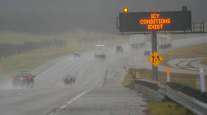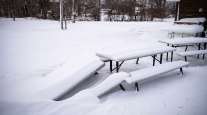Treatments, Tools Help Fleets Battle Corrosion, Snow Accumulation

[Stay on top of transportation news: Get TTNews in your inbox.]
Snow and ice, as well as the chemicals used to keep highways clear, can bring additional challenges to fleets during winter months.
Most highways are treated with calcium chloride or magnesium chloride, said Jeff Rogers, director of field maintenance for Ryder.
“They’re very effective to make the roads safe, but they are hazardous to vehicles,” he said.
RELATED: Fleets Take Precautions to Keep Equipment Running in Extreme Weather
During winter months, Dupré Logistics washes equipment more frequently to try to combat corrosion that can come from the chemicals, said Scott Allen, director of fleet assets and maintenance.
Dan Carrano, vice president of fleet maintenance for A. Duie Pyle, said most of the fleet’s locations have automated, drive-through wash bays.
“Any time after a storm, we’ll run as much of the equipment as we can through our wash bays that have underneath jets that spray from the floor upward, so it washes the undercarriage of the vehicle,” he said.

A driver removes winter grime from his truck. (Ryder)
Rogers said it is essential to get under the hood and frame when washing equipment. Ryder also protects exterior connections, such as liftgate cables, with a special product that repels moisture.
Penske factory treats its frames, bolts and hardware with corrosion inhibitors to minimize the risk of corrosion. Technicians then treat equipment annually and inspect vehicles during preventive maintenance to catch any issues, said Mark Swift, Penske Truck Leasing’s vice president of field maintenance for the north-central region.
Snow and ice create additional challenges if they accumulate on the top of tractors and trailers. Rogers said removing snow and ice is important because it is a safety issue.
“Most of the states in the Northeast and central regions have enacted specific laws addressing snow and ice removal from commercial and passenger vehicles,” he said.
Every A. Duie Pyle location has a snow scraper that tractors and van trailers pull underneath to remove the snow.
“It is a huge hazard driving down the road with that accumulation of snow. Eventually, that snow packs, turns into ice and comes flying off,” Carrano said, adding that the weight of the snow also is a concern. “The trailer roof can actually collapse.”
To help offset the risk of a collapse from snow weight, A. Duie Pyle, which is based in West Chester, Pa., specs its trailers with additional roof bows.
“It is almost like rafters in your house. Typical is 24-inch on center. We do 12-inch on center because of where we operate,” Carrano said.
Drivers for Penske Logistics, which is based in Reading, Pa., carry a snow rake.
“There are snow scrapes out there, but they don’t seem to be in the right place at the right time,” Swift said. “We have our own road service department, so if drivers need support getting snow or ice removed for safety, we can send out our team.”
Some of Ryder’s shops have wash bays, and high-pressure water removes the snow.
“For safety reasons, we don’t allow our employees to get up on the roofs or stand on the roof,” Rogers said. “We recommend using a telescopic roof rake that can pull the snow off. It is very effective and doesn’t require a lot of strength.”
Want more news? Listen to today's daily briefing:




